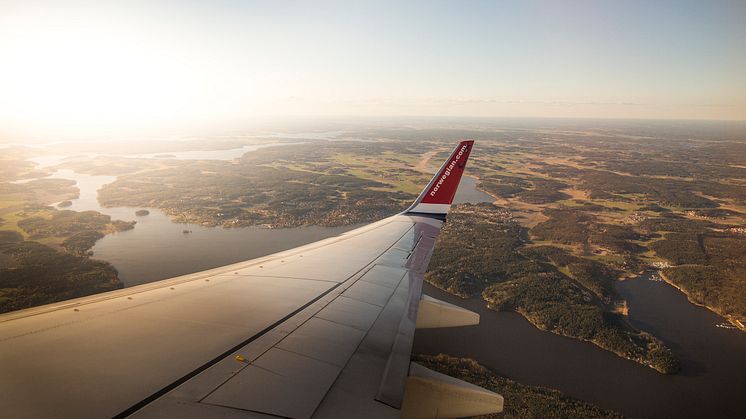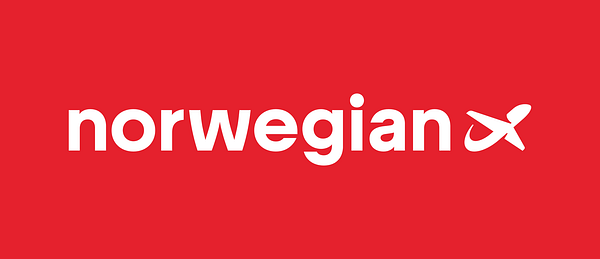
Press release -
Norwegian Group reports record June with 2.8 million passengers
In June, Norwegian had 2,371,908 passengers, which sets a post pandemic record for June. Widerøe had 394,290 passengers, bringing the group total to 2,766,198. The load factor for both Norwegian and Widerøe increased with a solid four percentage points compared to last year. In addition, Widerøe delivered record high passenger numbers during the month.
“We are very pleased to see June coming in with strong traffic figures. For Norwegian we had the highest passenger number and load factor for June since 2019, and solid traffic figures overall. Widerøe also had a great month, with the most passengers in the company’s over 90-year history,” said Geir Karlsen, CEO of Norwegian.
Norwegian’s capacity (ASK) in June was 3,698 million seat kilometres, down 0.2 percent from last year. Actual passenger traffic (RPK) for Norwegian was 3,268 million seat kilometres, up 5 percent. The load factor was 88.4 percent, up a solid 4 percentage points. Norwegian operated an average of 89 aircraft during June.
Widerøe’s capacity (ASK) in June was 192 million seat kilometres, up 4 percent from last year. The actual passenger traffic (RPK) for Widerøe was 156 million seat kilometres, while the load factor was 81.1 percent, also up over 4 percentage points.
Norwegian and Widerøe’s punctuality, defined as share of flights departing within 15 minutes of scheduled time, was 81.6 percent and 89.1 percent, respectively. Regularity, measured by the share of scheduled flights taking place, was 99.8 percent for Norwegian and 97.8 percent for Widerøe.
Peak season is here
During July, Norwegian and Widerøe will operate over than 400 routes to more than 170 destinations across Europe.
“We are well prepared for the summer peak season. July will be very busy, and the booking momentum into the autumn looks promising. We continue to deliver one of the best on-time performances in Europe, and I would like to thank all our great colleagues across the network who are working hard to maintain this position,” said Geir Karlsen.
During June, Norwegian launched its new booking platform across all markets. The platform will offer exciting new possibilities, not least among them interlining with Widerøe later this year.
A separate press release on Widerøe’s traffic figures is available at the Widerøe media centre (In Norwegian only).
Topics
Categories
About Norwegian
The Norwegian group is a leading Nordic aviation company, headquartered at Fornebu outside Oslo, Norway. The company has over 8,200 employees and owns two of the prominent airlines in the Nordics: Norwegian Air Shuttle and Widerøe’s Flyveselskap. Widerøe was acquired by Norwegian in 2024, aiming to facilitate seamless air travel across the two airline’s networks.
Norwegian Air Shuttle, the largest Norwegian airline with around 4,700 employees, operates an extensive route network connecting Nordic countries to key European destinations. In 2024, Norwegian carried 22,6 million passengers and maintained a fleet of 86 Boeing 737-800 and 737 MAX 8 aircraft.
Widerøe’s Flyveselskap, Norway’s oldest airline, is Scandinavia’s largest regional carrier. The airline has more than 3,500 employees. Mainly operating the short-runway airports in rural Norway, Widerøe operates several state contract routes (PSO routes) in addition to its own commercial network. In 2024, the airline had 3.8 million passengers and a fleet of 49 aircraft, including 46 Bombardier Dash 8’s and three Embraer E190-E2's. Widerøe Ground Handling provides ground handling services at 41 Norwegian airports.
The Norwegian group has sustainability as a key priority and has committed to significantly reducing carbon emissions from its operations. Among numerous initiatives, the most noteworthy is the investment in production and use of fossil-free aviation fuel (SAF). Norwegian strives to become the sustainable choice for its passengers, actively contributing to the transformation of the aviation industry.


